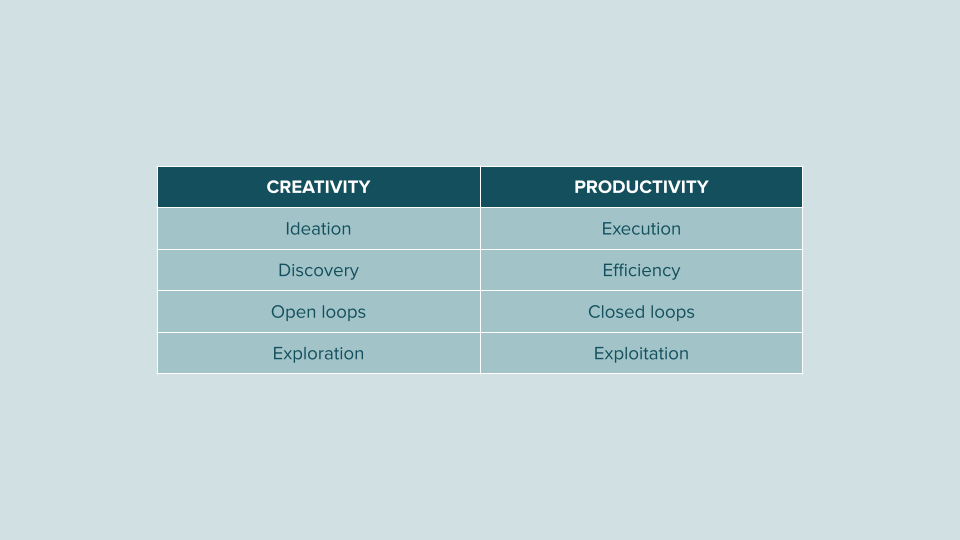Most productivity methods will encourage you to focus on one thing at a time. The idea is to avoid multitasking and to concentrate all of your energy one one goal until you achieve it. There is a lot of wisdom behind the “one thing at a time” principle, but is it always the best approach? As with many rules of thumb, a little bit of nuance is needed. Depending on the stage of the project you are working on, open exploration may generate higher quality output.
Open loops versus closed loops
There is no doubt multitasking is a productivity killer. Research shows we are slower when we have to switch tasks than when we repeat the same task. Some studies also suggest we waste even more time as the complexity of the tasks increase. However, great work is not purely about being productive — we need to be creative as well.
Similar to the way you need both exploration and exploitation in order to foster innovation, you need both open loops and closed loops to produce great work. In the exploration phase, you may wander through many creative paths. In the exploitation phase, you will choose a few select ones of these paths to execute on. First, you create open loops to cultivate your creativity; then, you close those loops to increase your productivity.
Research suggests that the more ideas we generate, the more creative they become. Focusing on one thing at a time too early in the creative process defeats the purpose of the exploration phase. Networked thinking requires to keep many open loops to connect ideas across various work streams. Only when you have spent enough time identifying patterns and connecting ideas together should you pick one work stream to focus on.
That being said, we do need to close some of the open loops at some point in the process if we want to turn our ideas into tangible output. Too few open loops and you may miss on some innovative ideas; too many open loops and you will end up with an unmanageable stream of ideas with nothing to show for it.
Balancing discovery and efficiency
In order to balance discovery with efficiency, we should practice open exploration for creativity, and then focus on one thing at a time for productivity. This general principle can be applied to many areas of life and work:
- Self-education. First, explore different educational channels to see which one would work best for your learning goals; then, commit to one, and stick with it for a while. Don’t fall into the trap of starting a new course every few weeks without completing any.
- Habit building. Spend a bit of time to decide which habits may be the most beneficial for you to build. As research shows it takes about two months to create a new habit, it’s not a light commitment — once you have decided which one to focus on, give it enough time so it becomes automatic.
- Project management. You will often have to work on several deliverables when working on big projects. When closing loops, make sure to block time for specific tasks to improve your productivity. But remember it’s crucial to give enough time to the exploration phase with creative projects. Don’t rush into the exploitation phase, and feel free to come back to your previous open loops if the path you picked doesn’t seem to be the right one.
You may not want to use the same tools for creating open loops and for closing loops. The first phase is akin to growing a garden, whereas the second phase is closer to building an edifice. Luckily, many tools for thought are now cross-compatible, so you can seamlessly go from generating ideas to executing on them.
Make sure to leave space for self-reflection as well. Ask yourself: were there some open loops I should have explored further before committing to a specific path? Am I using the right tools for the job? Am I giving myself enough time to figure out whether the direction I decided on is the right one? Journaling is a great method for metacognition and may help you improve both your creativity and your productivity.
Personal development is about alternating between phases of open exploration and phases of focused efficiency. This endless loop is where continuous growth stems from. As Idries Shah wrote: “A man is deficient in understanding until he perceives that there is a whole cycle of evolution possible within himself: repeating endlessly, offering opportunities for personal development.”

